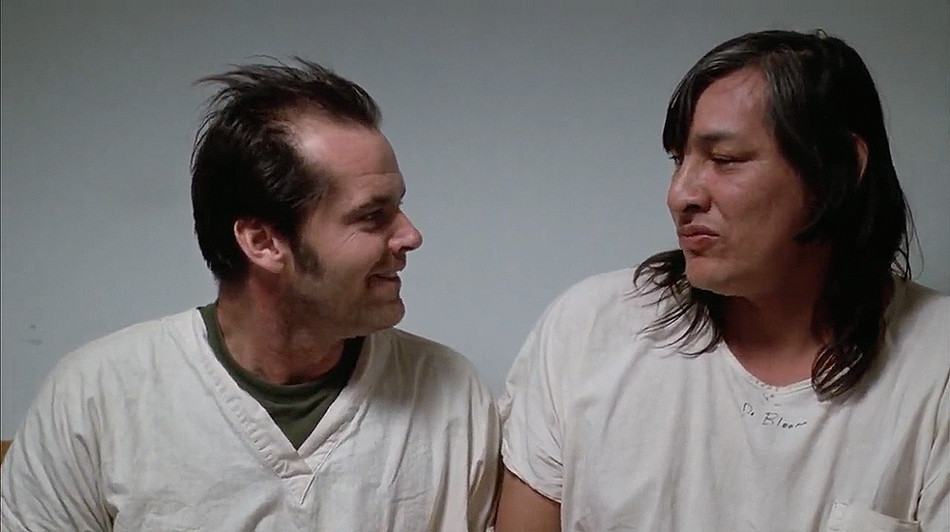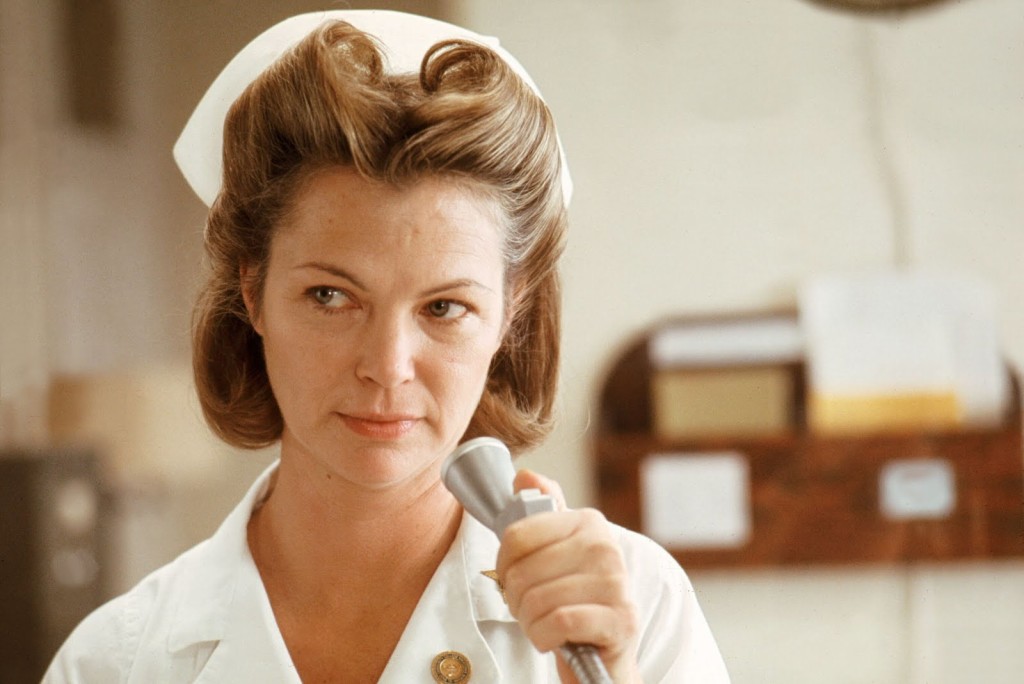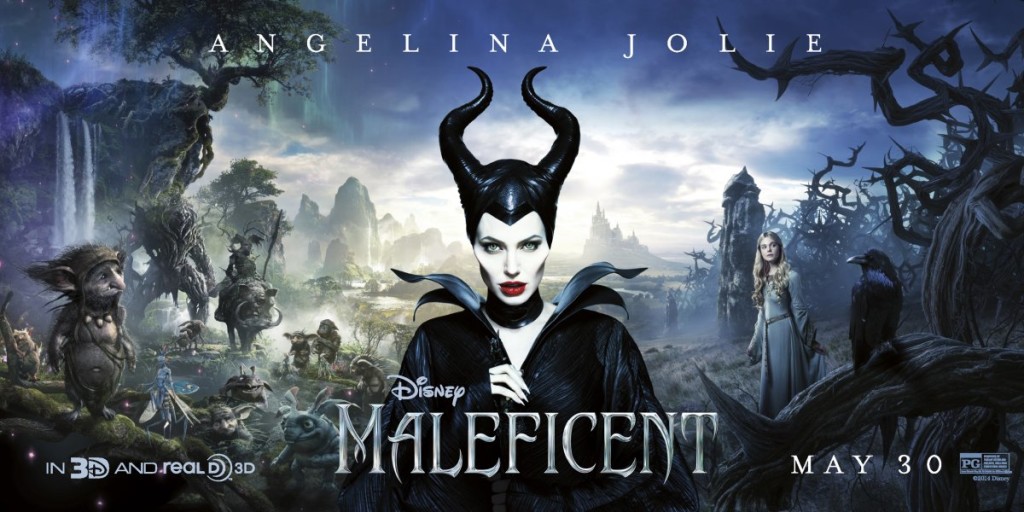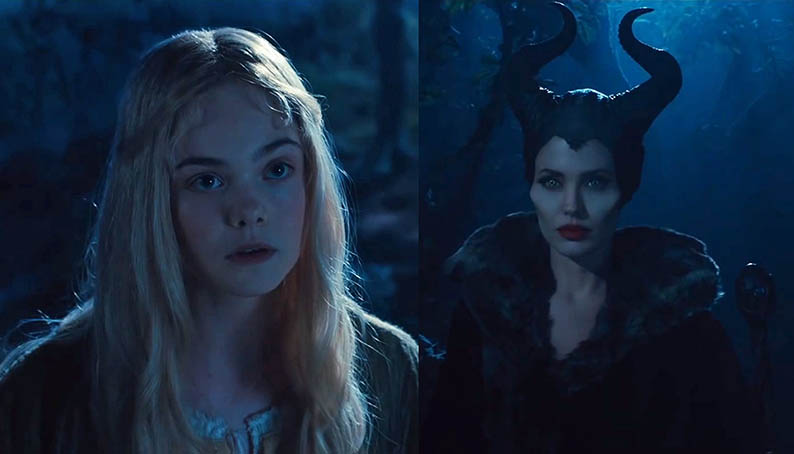 Would you rather work with this guy…
Would you rather work with this guy…
I feel bad about last week’s negative article. So I wanted to change it up today. Two things happened to me in a matter of hours Tuesday that reminded me of an essential quality all screenwriters must have in order to succeed.
It started when a writer informed me about an article they’d read in The Hollywood Reporter. In it, an anonymous working screenwriter complained that the life of a professional screenwriter, for the most part, sucks. The writer who’d read the article was upset. They said, “I’m working so hard to climb up this mountain, and this is what the end result will be? Misery 90% of the time? Why bother?”
I always get a little down when I hear these stories, and I’ll explain why in a second. But that afternoon, I had a meeting with another writer. For the record, this is a writer who’s had some success, but is nowhere near where he’d liked to be. He had this big smile on his face when I arrived and relayed how excited he was to talk about all the stuff he’d been working on. Before long, he was passionately telling me about all of his projects.
It didn’t even feel like a meeting. It felt like two people who love movies talking about writing them. I left that meeting with a noticeable hop in my step. Nothing earth-shattering happened. But I was happy. Why? The answer is simple. This writer’s overwhelming positivity had rubbed off on me. It had gotten me excited. It made me completely forget about that ridiculous article.
But something much bigger came out of that meeting. I realized how easily negativity can influence a writer’s life, and how quickly it can spread to others.
If that writer I’d met hadn’t been so immediately positive, I probably would’ve brought that negative energy into the meeting, and things would’ve gone very differently. Maybe I would’ve brought up the article, maybe we would’ve spent 30 minutes discussing if we thought it was true (being a professional writer sucks), then when the writer pitched me his ideas, they would’ve been laced with a sense of hopelessness, born out of our incorrect belief that making it was “impossible.” I would’ve left the meeting bummed out, and it would’ve taken me a day or two to get back to being excited about the business.
The thing about writing is that it’s such a lonely endeavor. And because you’re alone a lot of the time, your mind often drifts into the negative. “Can I do it?” “Is it impossible?” The doubts start creeping in. Rumors about how the only people who make it are those with family connections, or how nobody’s buying specs anymore, or how minorities don’t stand a chance, or how you have to live in Los Angeles to succeed.
Pay attention to what I’m about to tell you because it’s an often overlooked but ESSENTIAL component to your success in this business. Ready?
Negativity begets Negativity.
I know how crazy it sounds, but if you believe you’re never going to succeed, you won’t. You just won’t. Because you’ve already decided that you won’t. You’re just waiting for the official confirmation.
If you believe you’re going to succeed, you’ve got a chance. Because you believe. And as long as you believe, you’ll continue to make others believe.
You can see how that tiny insignificant Hollywood Reporter article spread like a virus from the original reader, to me, and almost to the other writer I met. Luckily a good dose of screenwriting chemo destroyed that negativity before it was too late. The only way to make sure that didn’t happen again was to stay away from that kind of person, the kind who complains, who hates, who sucks the life out of things. Positive successful people try to avoid those folks like the plague.
Again, if you believe in the negative? If you exhibit negativity? If you present yourself as a negative person, the majority of the experiences in your life will be negative. Negative people attract negativity. Positive people attract positivity.
Now I don’t know who this writer is in the Hollywood Reporter article. And I understand that his article is a tiny sample size of his career, but I’d make a strong case that the reason he isn’t as successful as he wants to be has a lot to do with how he sees the world. He sees screenwriting as a soul-sucking miserable existence. And there’s no way to mask that. Every meeting he goes to, every person he chats up, every job he’s up for, they see that. They feel it seeping out of his pores, or projected deep within his eyes. His negative posture, his lack of general happiness. They feel it, and they don’t want to be a part of it.
I used to think that it should be all about the writing. If the person is a good screenwriter, who the hell cares what they’re like? But I realize now how naïve that was. I still think it’s true for SUPER-STAR writers (David Koepp and Frank Darabont). But for everyone else, it matters tons. Some of the people I’ve met are such soul-suckers, that working with them for five minutes would depress the hell out me, much less five months. Even if the negative writer is the better writer, is it worth them always miserable, always complaining, always fighting every note, and generally hating work? It might take longer with the lesser writer, but their eagerness to get it right will trump the problem writer every time.
Negativity begets Negativity.
I’m going to tell you a story that I’ve only told a few times (and have alluded to in my book) because I’m actually quite embarrassed by it. But it’s a story that completely changed how I approached life. This happened a little bit before I started Scriptshadow when I was a REALLY negative person. I was that annoying guy who always found fault in everything. I was always complaining about the business, hating on every movie, commenting on how stupid the entertainment business was. I was like Grendl on crack.
A lady friend at the time delicately suggested I read The Secret. She thought it would be good for me. Now if you don’t know what The Secret is, it’s this book/movie/audio-tape “way of thinking” by which a soothing Australian woman tells you to do things like “imagine success” and success will come to you. “Imagine money” and money will come to you. Your basic new age hooey-phooey.
But I was in a really low place and knew that my negativity had reached dangerous levels. So I thought, “What do I have to lose?” and started listening to the audio version of the book while I exercised. If you haven’t heard this woman, it’s quite amusing. She has this over-the-top hypnotic voice that promises you the world if you just think positively.
I started listening to it more as a source of entertainment than enlightenment. But the woman started issuing challenges. She’d say things like, “Go out and say five positive things to people today.” For shits and giggles, I’d do it (“Hey, that’s a nice watch,” I’d say to the cashier at the supermarket) and I must admit I was surprised by the response. People would offer back a genuine smile, thank me, and even start up conversations. More importantly, after every interaction, I felt better. And when I’d talk with friends later, they’d note that I was uncharacteristically “upbeat.” Without me even knowing it, these positive experiences had started to improve my life.
But when the chapter about money came up, I couldn’t play the game any longer. What Nutty Soothing Australian Woman was saying was ridiculous. She posited that if you “thought” and “believed” that money would come to you, it would. In fact, she said, it would just show up in your mailbox in the form of a check. Money by just wishing for it! Who would’ve thought it was that easy!
I had never heard such blatant bullshit in my life. I had NEVER received money in the mail. Not once. So I decided to play a game with Nutty Australian Woman to prove her wrong. Over the next month, I would be genuinely positive about everything, and wherever I went, I’d believe – just like Nutty Australian Woman told me to – that I should receive money.
Over the next three weeks, I found my life improving dramatically. If a movie I didn’t like did well at the box office, I wouldn’t complain like I used to. I’d think, “Good for the writers.” I was genuinely happy for them. If somebody said something mean about something online, I’d try to find something positive to counter it. It almost became a game. No matter how negative a situation got, could you find a positive way to respond to it?
I noticed my friends were happier to be around me (I wasn’t interrupting every fun moment complaining about something), and because they were happier, I was happier. That’s the great thing about being positive. Whatever you give out comes back twice as strong.
But it was three weeks into my experiement that one of the biggest shocks of my life happened. When I went to get my mail that day, there was an envelope from the city of Los Angeles. I opened it up, and there was a check for $75. I shit you not. The letter was in regards to a parking ticket I had received last year. They went on to say they had made a mistake in the ticketing process, and were therefore refunding me.
Now as anyone who lives in Los Angeles will tell you, the LA parking ticket system is one of the most obsessive corrupt institutions in the world. They will wait at your car until your meter runs out in order to ticket you 1 second later. They’d rather commit Heaven’s Gate-level mass suicide before issuing a refund. I’m pretty sure I was the first person in the city’s history to receive money back for a ticket.
I couldn’t believe it. That freaking Nutty Australian Lady was right. I had received money in the mail. I was so excited (good God did I need that money), I had a newfound optimism about the world. That optimism led to me getting the confidence to do a lot of other things I’d been putting off. One of those things, a few months later, was starting Scriptshadow.
Now look. I’m not going to sit here and tell you you have to believe in some New Age Hooey in order to succeed. What I can tell you, from personal experience, is that trying to find the good in everything instead of wallowing in the bad, positively alters the way others perceive you. People will want to be around you. They’ll want to work with you. They’ll want you in their lives.
Positivity Begets Positivity.
And look, it’s not easy at first (especially if you’re inherently negative), and I still struggle with it at times (I’m not sure how positive I was yesterday, although analysis does require certain negative reactions), but I’m telling you, it’s the unsung hero of success. And I just want you guys to know that the more positive you are, the more opportunities you’re going to get in this business. I can promise you that. Don’t believe me? Give it a shot.
Genre: Drama/Weird
Premise: This dystopian tale follows a desperate man who breaks with the rules of a hotel where single people are obliged to find a matching mate within 45 days. If they fail, they are transformed into an animal of their choosing and released into the woods.
About: (did this research after I read the script) Yorgos Lanthinmos’s most well-known film, Dogtooth, is… different, to say the least. “The Times” in London called it “One of the darkest, most unsettling, weirdest films of the year,” which was apparently a badge of honor to the producers, so much so that they included the quote in the trailer for the film. Yorgos’s most recent film has a trailer that got 90% dislikes on Youtube, though it did win the Osella Award for Best Screenplay at the 68th Venice International Film Festival. I’ve never heard of the Osella Award for Best Screenplay but Venice is definitely a well-known festival. The Lobster will be Yorgos’s first English language film, and will star Colin Farrell and Rachel Weisz.
Writers: Yorgos Lanthimos & Efthimis Filippou
Details: 87 pages – April 30, 2013 draft
It’s never a good sign when I receive a script in the mail with the obviously sarcastic remark, “Have fun.”
Indeed, The Lobster sounds like a potential disaster in the making the further into the logline you go, but these out-there ideas are also the ones with the biggest upside. It’s kind of like when you heard about Being John Malkovich for the first time. A movie that’s going to star John Malkovich as himself? And someone’s going to go into his head? That could be awful. But it could also be revolutionary. It turned out much closer to the latter.
I, for one, am hopeful that this script will be awesome. As you can see, it’s got a solid cast, and while casts can come together for reasons other than a good script (most actors just follow the money), I’d like to hope that that’s the reason they came to The Lobster. Let’s find out.
I’m assuming we’re living in the future in The Lobster, but I don’t know how far forward and couldn’t even tell you for sure since the year is not noted. This is one of many unknown factors in The Lobster. What we do know is that David is our hero, although I must admit I deduced this because nobody else in the script has an actual name.
David’s wife leaves him for another man, and in this (possible) future, under these rules, if you’re alone you’re sent off to the “Hotel,” where you stay for a certain amount of time (it wasn’t clear from the script, but I’ll go with 45 days, since it was in the official press logline) with the hope of finding a new mate. If you can’t find a mate by that time, they turn you into an animal of your choosing. David, of course, has chosen a lobster (because they live to be 100 years old and they’re fertile all their lives).
But wait! There’s more! Every day, you get to go into the woods and hunt humans (called “Loners”). The more loners you kill, the longer you get to stay at the hotel. How ’bout that!
So, wait, Carson, you say. How can there be no character names? Well, because everyone’s got names like, “Nosebleed Man” and “Limping Man” and “Shortsighted Woman.” Oh, Shortsighted Woman is an important one actually, as she’s the woman David falls in love with. But not at the hotel. No, David actually leaves the hotel after killing Heartless Woman, who killed his dog, who actually was his brother, who had been turned into a dog.
Anyway, after David defects to the Loners, he has to abide by a whole new set of rules, namely that you can’t have sex or kiss or even flirt, which is ironic since there are more blowjobs and anal sex encounters in this script than there are in your average porn search.
So these two fall in love and have to find a place where there are no more rules, no more laws, no more people turning other people into animals – basically all the things keeping them from having sex ‘n stuff. But when the Loner Leader (no really, that’s her name!) finds out David and Shortsighted Woman are in love, she does something so horrible to Shortsighted Woman that it will test her and David’s love to the core!
 Colin Farrell’s non-lobster costume.
Colin Farrell’s non-lobster costume.
(…….… sorry, I need a moment to process what I just read….. and what I just wrote)
Okay. Yeah. Right. Here we go.
Ummm, to put in mildly, this script felt like it was written by a disturbed sixth grader. Now I get that there are “lost in translation” barriers at play. Our two writers are Greek and this is their first English-language film. I get that. Also, these guys make a different kind of movie. I looked at the trailer for Dogtooth above and, clearly, they embrace the hardcore indie storytelling approach of: little has to make sense as long as there’s something bizarre going on.
We also have to keep in mind that there isn’t a screenwriting industry in Europe (or the large majority of Europe, I should say). A lot of the directors write their own scripts and they write them to shoot – looking for weird shots or shocking moments as opposed to creating a well-thought out story.
Why?
Partly because of that lack of infrastructure. But also out of laziness. It’s much easier to write a bunch of nonsense than do the hard work and write something that moves audiences and, well, makes sense.
I think that’s the thing I get angriest about when I read European screenplays – is that the writers don’t look like they’re putting any effort into the craft at all. If they’re only going to make movies in their respective countries, where story requirements are a lot less stringent, that’s fine. But if you hope to break into the wider American market, you have to realize just how many people are over here trying to learn this stuff, and therefore have a leg up on you.
If you’re from another country, you have to put MORE effort in than your American counterparts, not the same, and definitely not less. Because they have a huge advantage over you in that there’s an entire screenwriting industry over here teaching people how to tell stories. If you put NO effort into screenwriting, then you’re going to get a story that reads like you put nothing into it. I mean, I guess there’s a progression in The Lobster here. But there are way too many things that happen that make zero sense. Why do you have to go to The Hotel if you’re single? Beats me! Why do they turn you into an animal if you don’t find a mate in this world? Your guess is as good as mine!
The Europeans do have one big advantage over us, however, and it’s why these guys are making a movie with Colin Farrell and Rachel Weisz, and you’re not. The only way they’re able to make movies over there is to make them themselves. They don’t have a spec market. So they have to get their hands dirty and figure out how to make a film. These two have now made three feature films, and that’s enough to prove to a financier that they know what they’re doing. So I’ll give them that.
But man, the downside is no grasp of story and the script really reflects that. Here’s a description line from early on in the script: “David is crying. The woman is not.” That’s how the entire script reads. Yeah, you want screenwriting to be short and to the point, but you still want some style. You still want some garnish. It’s hard to enjoy even a good story if the writing is THAT bland.
And while I understand it’s part of the writers’ voice, it was confusing to read a sequence where David fucks a woman, then wakes up the next day to hear her say, matter-of-factly, “I killed your brother. I left him to die very slowly. He may not be dead yet, even as we speak. I was kicking him for ages.” Why did she kill his brother/dog? No idea. Never explained.
I don’t know, this all seems like it’s just trying to get a rise out of you, and to me that’s gimmicky. Anyone can string together a series of shocks with little to no skill. There’s no substance in these moments, unless there’s a larger theme that I’m not grasping. Whichever way you look at it, this was not a good reading experience. And that makes me sad. I was hoping for something brilliant.
[x] what the hell did I just read?
[ ] wasn’t for me
[ ] worth the read
[ ] impressive
[ ] genius
What I learned: If I see a 10-line description within the first 10 pages of a script (or really anywhere in the script), it is a 100% guarantee that the script will be bad. After reading 6000 scripts, this equation has never failed.
Many people believe that the 70s was the second Golden Era of film, but whether the decade created amazing cinema or not, the reality is there are a lot more forms of entertainment these days, the movie-going demographic has changed, and we’ve been programmed to have shorter attention spans. So no matter how you look at it, the way we tell stories in the medium is different than it used to be. Which makes me nervous about propping up a 70s film to learn screenwriting. With that said, a good story is a good story, and I’m certain that this script would get made today (who would play McMurphy though??). It has that “No. 1 Black List Spot” feel to it. Its secret ingredient is its characters. The film has one of the best collections of characters in history. For those who haven’t seen it, “Nest” is about a convict, McMurphy (Jack Nicholson), who tries to play the system by pretending to be crazy, believing it’ll be a lot easier to do his time in a mental facility than in prison. Once there, he rouses the other patients into action, helping them realize that even if they’re crazy, they can still have fun. But when the floor manager, the deceptively evil Nurse Ratched (one of the best villains ever), sees that she’s losing a hold on the patients because of McMurphy, she finds a horrifying way to solve the problem. One Flew Over The Cuckoo’s Nest won an Oscar for Best Adapted Screenplay.
1) Starting as late into the story as possible – Yesterday we discussed how you want to start your script AS CLOSE TO the main action as possible. Here’s an example of that in action. In the script for “Cuckoo’s Nest,” we start off with McMurphy at prison, showing him causing trouble. Only then does he get sent off to the ward. In the movie, we don’t show that. We just show McMurphy showing up to the mental ward. It was a good decision. Why do you need to show McMurphy causing trouble at a prison when you can just show him causing trouble as soon as he gets to the mental ward? Additionally, we get to jump right into the story.
2) The “Institution Disruption” Flick – They used to do a lot more of these films (Cuckoo’s Nest, Cool Hand Luke, K-Pax, Shawshank) but you don’t see them as often these days. And I’m not sure why. They’re an excellent set-up for a story. You have an institution (prison, mental ward, school, army) that’s running smoothly, then you bring in a dangerous character who upsets the balance of the group. Conflict is built into the premise, since the establishment will want to regain control over the disrupting individual, which means that a lot of the scenes will write themselves (I’ve found that when you introduce natural conflict into a story, scenes write themselves).
3) How to name a villain – This is well-known device, but I’ll repeat it here anyway. To name your villain, find a negative and/or scary word, then move a few letters around until you get something that sounds similar. “Hatchet” is the operative word here, of course. The writers turned that into Nurse “Ratched.”
4) Ironic villains are typically the best villains – Nurse Ratched is one of the best villains in the history of cinema. But is it because she’s an outward bitch? Because she’s always mean? No. Nurse Ratched is actually quite logical. She’s also calm, and she genuinely wants to help everyone. Her motivation is noble. Had Nurse Ratched had a “Wicked Witch of the West” scowl the second we met her, the character would’ve been infinitely less interesting. This is yet another example of writing villains the OPPOSITE of what you’d expect a villain to be.
5) The dialogue before the storm – One of the things a lot of screenwriting books tell you to do (and I’ve said this too) is to start as late into a scene as possible. For example, if two partners are meeting to talk about their failing business, you’d cut to them in an office with the first line being, “How did we get here?” The thing is, you don’t always want to do that. If you do, your script will start to feel rigid and lifeless. Instead, write in some “dialogue before the storm” to give the illusion of “real” conversation. So when McMurphy is called in to the President’s office to discuss why he’s here at the ward, we don’t start with, “Why don’t you tell me why you’re here, Mr. McMurphy.” We start with McMurphy noticing a fishing photo on the president’s desk and asking him about it. It’s a slightly awkward conversation, since the president wasn’t prepared to talk about the photo, but more importantly, it felt natural. I wouldn’t use this approach in every scene. But you should do it every now and then to create the illusion of reality.
6) Give us one scene that encapsulates the world the protagonist is now in – In the “Institution Disruption” flick, it’s vital that you write a scene that shows the audience exactly what kind of world we’re in. One of the first scenes in “Cuckoo’s Nest” is McMurphy taking part in his first “Group Therapy” session. In it, one of the characters starts yelling at another. Another one quickly breaks down. Another one starts rocking back and forth. Everybody else takes sides, until everyone’s either screaming or yelling or arguing or rocking or making noises. McMurphy looks around at all this chaos. It’s at that moment that we know exactly what kind of world we’re in.
7) Mid-point shift – Remember that the mid-point shift is the moment in your script (roughly the middle of the movie) where something happens that SHIFTS the story in a slightly different direction. Without it, your script will start to feel redundant. The mid-point shift in “Cuckoo’s Nest” happens subtly, when McMurhpy brags to one of the guards that he’s getting out in two months. The guard corrects him. His prison sentence may have had two months left on it. But here at the mental ward, they can keep you… forever. McMurphy’s world is rocked. He had no idea that was the case. Now his “goal” shifts from “act crazy” to “escape.”
8) How to build characters in an ensemble – When you have a bunch of characters in a group, you don’t have time to explore them all. But each of them must still be memorable. To achieve this, give each of them ONE DOMINANT MEMORABLE TRAIT and then keep hitting on that trait throughout the script. One of the patients believes he’s smarter than everyone and looks down on the other patients as a result. Another is the “village idiot” who just smiles all the time. Another just wants everybody to get along. Another has zero self-confidence and is afraid to speak up. When you don’t find that trait, the character will disappear. Christopher Lloyd is actually in “Cuckoo’s Nest,” but you don’t remember him because they didn’t give him a specific trait. You can find this approach in Cuckoo’s Nest, Toy Story, Cool Hand Luke, Shawshank and many other films.
9) The anti-hero method for saving the cat – Anti-heroes shouldn’t save the cat like traditional heroes. Their saving should be a little more complicated. In fact, they might even kick the cat a few times before saving it. If you write them doing something overly nice in a way that’s completely out of character, the story will ring false and the audience will turn on you. The “Save the Cat” moment in Cuckoo’s Nest is when McMurphy tries to befriend the deaf and dumb giant, “Chief.” It’s his support of the character when nobody else supports him, that earns him our sympathy. The amateur writer probably would’ve written this scene with somebody bullying Chief, and McMurphy stepping in to save him. FORCED! Instead, what does McMurphy do? He makes fun of Chief! He does an offensive “How” impression of an Indian. Then does an even more offensive Indian dance to get him to react. It isn’t until later, when he teaches Chief to play basketball, that he starts to help him.
10) Writing a friendship into a story – There’s something about writing a friendship into a story that is so powerful if done right. From McMurhpy and Chief here, to Ratso and Joe Buck in Midnight Cowboy, to Red and Andy in Shawshank, to Vasquez and Drake in Aliens. When you do this, for whatever reason, it makes us like the characters twice as much. You guys are welcome to hypothesize on why this is, but all I know is that watching Chief and McMurhpy become friends made me like each of them that much more.
Genre: Fantasy/Family
Premise: (from IMDB) A vindictive fairy is driven to curse an infant princess only to realize the child may be the only one who can restore peace.
About: Malificent is one of the more daring movies Disney has ever released. As the title implies, the film is centered around one of the most famous villains of all time, Sleeping Beauty’s “Malificent.” For Disney to center a film around a villain is one thing, but to center it around a character this evil is a surprising move. Releasing the film in the middle of the year’s biggest movie season is yet another gamble. You’re competing against X-Men, Spider men, and really muscular men, all with bigger fan bases. I have to admit I’m fascinated by this choice, and am eager to see if anyone shows up. Writer Linda Woolverton has been writing for Disney forever. She wrote 2010’s Alice in Wonderland as well as the classics, The Lion King and Beauty and the Beast. In other words, if you’re going to do something daring with a Disney property, this is the woman you want writing it.
Writer: There’s no title page here, but this draft looks to have been written by Linda Woolverton. Disney favorite John Lee Hancock helped with rewrites on later drafts.
Details: 110 pages (unknown draft)
One of the age-old questions in screenwriting has been, “How do you make an audience root for an unlikable hero?” It’s easy to make someone root for an underdog like Forrest Gump or Wall-E. It’s not as easy to make them root for Captain Jack Sparrow or Cool Hand Luke. This question resurfaced when I heard they were having a hard time coming up with a Boba Fett spin-off film for the Star Wars franchise. Boba Fett is a bad guy. How do you make him the hero?
This argument typically parlays itself into the emergence of an antihero. In those cases our protagonist is just as bad as he is good, which makes us a little more uncomfortable about rooting for him. If you do this right, you can create a classic character. Everyone loves themselves a Jack Sparrow. But the ingredients are trickier to mix with anti-heroes. An extra dash here or a tiny spill there can be the difference between a perfect protagonist and a despicable one. Let’s find out which side of the forest Maleficent ended up on.
Now, I haven’t seen Sleeping Beauty in maybe 20 years. So I had to do some Wikipedia searching to catch up. But I realized this is basically Maleficent’s side of the Sleeping Beauty story. Maleficent starts out as a young, winged fairy who’s bigger than all the other fairies for some reason. She’s infatuated with a boy named Stefan, and it looks like they’re going to fall in love and get married.
That’s until he betrays her and joins the Human Land. After becoming chummy with the humans, Stefan tries to go back and kill Maleficent (man, that romance ended quickly), but instead is only able to clip off her wings. My man, Stefan. That was a baaaaad move. A wingless Maleficent is an angry Maleficent.
Many years later, Stefan becomes king (after standing by while the real king chokes to death – classy move) and has a child. This child’s name is Aurora (Aurora is the name of Sleeping Beauty. Did you know that? I didn’t. I thought her actual name was “Sleeping Beauty”). After a confusing array of events, a fairy casts a spell on Aurora that says when she turns 16, she’ll fall into a deep sleep and won’t wake up until her true love kisses her.
Afraid of Maleficent, Stefan hides Aurora in the forest with the fairies until she’s 16. But that incredibly genius idea turns out to backfire, since Maleficent lives in a hut only a short walk away. The two eventually meet up (ON PAGE 75 – THREE-QUARTERS OF THE WAY INTO THE STORY), and Maleficent actually ends up liking Aurora.
The two become friends, however, when Aurora turns 16, she falls into that deep sleep. Maleficent realizes she’s screwed, since there’s no one in the land whose kiss can wake her up. Which means she’ll have to find another solution. Whatever will that solution be….?
Before we even get to the antihero stuff, I have to say how freaking messy the structure of this script was. It kept jumping forward in time over and over again. No story was able to start as just when we’d get close to something happening, we’d jump again. We jump from Maleficent’s teenage years, to her young adult years. And then Stefan has Aurora, and SHE has to grow up, so we have to bumble through another 16 years. Which is why it took until page 75(!) before our two key characters even met!
I think that’s insane. Whenever you write a script, one of the key decisions you have to make is where to start your story. The idea is to start as CLOSE TO THE ‘KEY STORY’ as possible. The further back you start from that moment, the more mud you have to drag the reader through to get to the good stuff.
Take Die Hard for example. We could’ve started that movie back in New York. We could’ve watched John and his wife get married, have kids, fight, her get the job in LA, leave, see him alone for awhile, AND THEN show him come to Los Angeles. But how boring would it have been to slog through all of that? Instead, we started with John showing up in LA so we could get to the good stuff as soon as possible.
To me, the story here is Maleficent and Aurora. So why are we only getting to that on page 75? I understand that the movie is called “Maleficent” and they probably want to explore how she became this evil person, but to have to sit through 5 time bumps just to get to the good stuff? That feels sloppy to me. And the truth is, they didn’t even do a good job explaining how she became evil. Stefan betrayed her, but she was already a bitch before that.
Look at another fairy tale, Shrek. The timeline for that was three days! You can have time jumps in a script, of course, but you should try to contain them inside the first 15 pages if possible. Whether it be with Up or Frozen, we pass all the time we need to pass immediately, and then we can get to the story.
Now, on to the question of the day. How was Maleficent as an antihero? This is how I saw it: I never learned why Maleficent was a bitch. She hated humans from the beginning of the script, so I didn’t gain any understanding of why she was who she was. It’s not that I NEED to know that with every character. But this script is practically screaming the fact that it’s going to tell us this girl’s origins. So why aren’t we learning her origins?
Eventually Stefan steals her wings and becomes the king, setting him up as our “true” villain in the story. But I didn’t think he was any worse than Maleficent. A trick to making an audience like an antihero is to write a villain that’s way worse than him/her. We’ll want the villain to go down so much that we won’t mind rooting for a “bad” hero. But again, these two seemed about the same to me (with a VERY SLIGHT advantage going to Maleficent), so I didn’t have a rooting interest.
It seems to me that this story is banking on the fact that you know the Sleeping Beauty story like the back of your hand, and therefore will wait patiently until the Maleficent/Aurora storyline arrives. But since this will be for children, will these children have seen Sleeping Beauty? Likewise, will the parents remember it well enough (again, I forgot that Aurora was the name of Sleeping Beauty)? I don’t know. We’ll have to see.
One thing I’ll give credit to Disney for is taking a chance. This is unlike anything they’ve ever done before. And with all the money they’re making lately (no one’s making more bank than Disney these days), they should be taking chances. Unfortunately, I don’t think this chance paid off, UNLESS John Lee Hancock did an Almost Page 1 rewrite on it. We’ll have to see. But I’ll ask you guys in the meantime, especially parents with children. Are you interested in seeing this film?
[ ] what the hell did I just read?
[x] wasn’t for me
[ ] worth the read
[ ] impressive
[ ] genius
What I learned: Dichotomy with anti-heroes – The trick with anti-heroes is to give them ONE GOOD THING they’ve got going for them (so there’s SOMETHING to root for), and then one element of darkness. That dichotomy of light and dark is what makes these characters so fascinating. A lot of the time, the “good trait” is humor (Jack Sparrow, Tony Stark, Cool Hand Luke, Randle McMurphy from Cuckoo’s Nest). And the “darkness” is self-destructive behavior (Henry Hill, Jordan Belforte). In extreme cases, the darkness is sociopathic or even psychotic behavior (Patrick Bateman from American Psycho). If you don’t have that perfect light/dark balance with your antihero, chances are, we’re not going to care about them. I’m not saying I didn’t care for Maleficent, but she definitely wasn’t interesting enough to keep me engaged the entire read.
This is your chance to discuss the week’s amateur scripts, offered originally in the Scriptshadow newsletter. The primary goal for this discussion is to find out which script(s) is the best candidate for a future Amateur Friday review. The secondary goal is to keep things positive in the comments with constructive criticism.
Below are the scripts up for review, along with the download links. Want to receive the scripts early? Head over to the Contact page, e-mail us, and “Opt In” to the newsletter.
Happy reading!
TITLE: LOWLIFE
GENRE: CRIME THRILLER
LOGLINE: With a newborn in a coma, a small-time enforcer is pushed deeper into a world of violence and deceit when he finds himself indebted to the dirtiest cop on the street.
WHY YOU SHOULD READ: I have spent way too much time polishing this thing to just let it go. It placed in the quarter-finals of the Nicholl’s last year and the semi-finals of the Screencraft Fellowship earlier this year, but the real goal here is to have it posted on AOW. I have submitted it before with no results, but this draft is not only the latest, not only the greatest, but the last. I’m moving on to other projects and putting this in my arsenal for now, but not without trying to get it out to my fellow SS commentators one more time.
TITLE: A Cinematic End
GENRE: Contained Thriller/ Dark Comedy
LOGLINE: A man retreats to his secluded cabin to commit suicide. His plans are delayed when movie characters start showing up.
WHY YOU SHOULD READ: Because the logline grabbed your attention. I also whipped up this poster to get some additional interest going: http://imgur.com/LW8xcSq
TITLE: Knit Wits.pdf)
GENRE: Comedy
LOGLINE: After the passing of their mother, three estranged brothers must reunite and take over the family knitting business.
WHY YOU SHOULD READ: “Knit Wits” is a cross between “Horrible Bosses” and “Silver Linings Playbook.” It’s an edgy comedy with a lot of heart that focuses on three men running a knitting business. Now, I tried to learn how to knit in order to do some research before writing the script, but it was a total nightmare. Much of that frustration is showcased in this spec. Knitting is not for me. However, writing about it in a comedic way is much more my style and a hell of a lot more fun!
TITLE: Simple Acts
GENRE: Dramedy
LOGLINE: A cynical self-destructive film critic finds a new perspective on life through a close-knit benevolent family.
WHY YOU SHOULD READ: Having read hundreds of amateur screenplays on my job and only finding about 2% of them to be competent, I completely empathize with you when so many of the scripts you read get a ‘wasn’t for me’. I feel the pain dawg! I thought I should give you a script which charms and entertains you enough so that the time and efforts you spend on reading it is rewarded with at least a few chuckles and smiles.
TITLE: The Devil’s Hammer
GENRE: Horror
LOGLINE: When an outlaw biker, and soon to be father, attempts to leave the sins of his old life behind, he is pushed by a vengeful Sheriff into the arms of an ancient cult of disease worshiping sadists.
WHY YOU SHOULD READ: I possess a Bachelor of Liberal Arts from Harvard University and have written published columns for multiple notable financial sites such as; Seeking Alpha, Morning Star and Yahoo Finance. On-top of all this, I am a kid from the streets, who grew up in squats, and gang life. This screenplay hits home for me.








